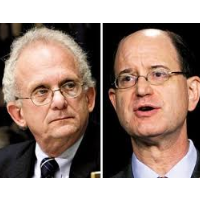Democrat vs. Democrat in Congressional Race Puts Spotlight on Republicans
 Congressmen Howard Berman, left, and Brad Sherman
Congressmen Howard Berman, left, and Brad Sherman
When state redistricting forced Democratic congressional stalwarts Howard Berman and Brad Sherman into head-to-head competition, party leaders hoped that one of them would step aside to avoid a primary spectacle.
They didn’t get their wish and now the spectacle of prominent Southern California Jewish Liberal Democrats pummeling each other in a primary has been enhanced by the additional spectacle of Democrats pleading for, and receiving, the support of prominent Republicans in the general election.
Prior to this year, the Dem-on-Dem primary debacle—which in this case was won by Sherman—would have marked the end to intraparty blood-letting and the winner would have moved on to savaging the Republican opponent in the days leading up to the November election.
But a new state law, which allows the two top vote getters in an open primary to advance, has the two Democratic candidates going where very few Dem candidates have gone before—across the aisle. Eight out of the state's 53 congressional districts have intraparty races.
Republican Senators John McCain of Arizona and Lindsey Graham of South Carolina like Berman’s bipartisan can-do spirit and endorsed the congressman earlier this week, along with independent Senator Joe Lieberman of Connecticut. Sherman said Berman was getting the vote of fellow warmongers who supported the invasion of Iraq when George W. Bush was president, but failed to mention that he also voted to authorize military force there in October 2002.
Sherman then unveiled his own list of GOP admirers, including Assemblyman Cameron Smyth, Los Angeles City Councilman Mitch Englander and Burbank City Councilman Gary Bric, and proclaimed that “every Republican official who lives in or near the San Fernando Valley” is on his side.
Berman countered with area Republicans of his own, including neighboring Representatives Ed Royce and Elton Gallegly, and L.A. County Supervisor Mike Antonovich.
Although Berman is the favorite among Democratic Party leaders, he currently represents only a fourth of the newly-configured district, while Sherman represents about a half. Sherman won the primary by 10 points.
Both candidates have talked trash about their opponents as if they were, uh, Republicans, and any fears that California’s new one-party general elections would lack the fire of the old two-party variety have been unfounded. Berman maintains a website full of Sherman beatdowns and Sherman, for his part, takes his shots wherever he can.
Two weeks, the Sherman campaign filed a complaint with the Federal Election Commission that Berman illegally overpaid his brother, Michael Berman, and his political consulting firm an extravagant amount of money for campaign services over two decades.
–Ken Broder
To Learn More:
Howard Berman Gets GOP Support in Calif. Race (by Kyle Trygstad and Niels Lesniewski, Roll Call)
Democratic Reps. Sherman and Berman Tout Republican Support (by Jean Merl, Los Angeles Times)
Democrats Fight for GOP Vote in California's 30th (by Lauren Fox, U.S. News)
Sherman Alleges Berman Illegally Overpaid Brother for Campaign Work (by Jean Merl, Los Angeles Times)
Berman v. Sherman (by Jonah Lowenfeld, Jewish Journal)
- Top Stories
- Controversies
- Where is the Money Going?
- California and the Nation
- Appointments and Resignations
- Unusual News
- Latest News
- California Forbids U.S. Immigration Agents from Pretending to be Police
- California Lawmakers Urged to Strip “Self-Dealing” Tax Board of Its Duties
- Big Oil’s Grip on California
- Santa Cruz Police See Homeland Security Betrayal in Use of Gang Roundup as Cover for Immigration Raid
- Oil Companies Face Deadline to Stop Polluting California Groundwater





